人教新目标版英语七年级下Unit 11 How was your school trip?Grammar Focus- 3a课件(17张PPT无素材)
文档属性
| 名称 | 人教新目标版英语七年级下Unit 11 How was your school trip?Grammar Focus- 3a课件(17张PPT无素材) | 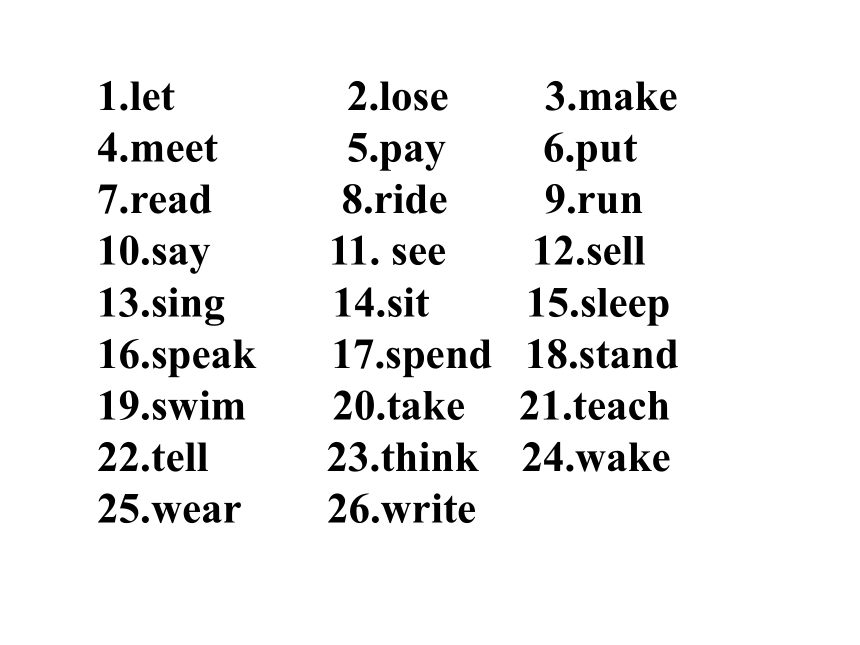 | |
| 格式 | zip | ||
| 文件大小 | 153.0KB | ||
| 资源类型 | 教案 | ||
| 版本资源 | 人教新目标(Go for it)版 | ||
| 科目 | 英语 | ||
| 更新时间 | 2020-06-18 23:23:02 | ||
图片预览

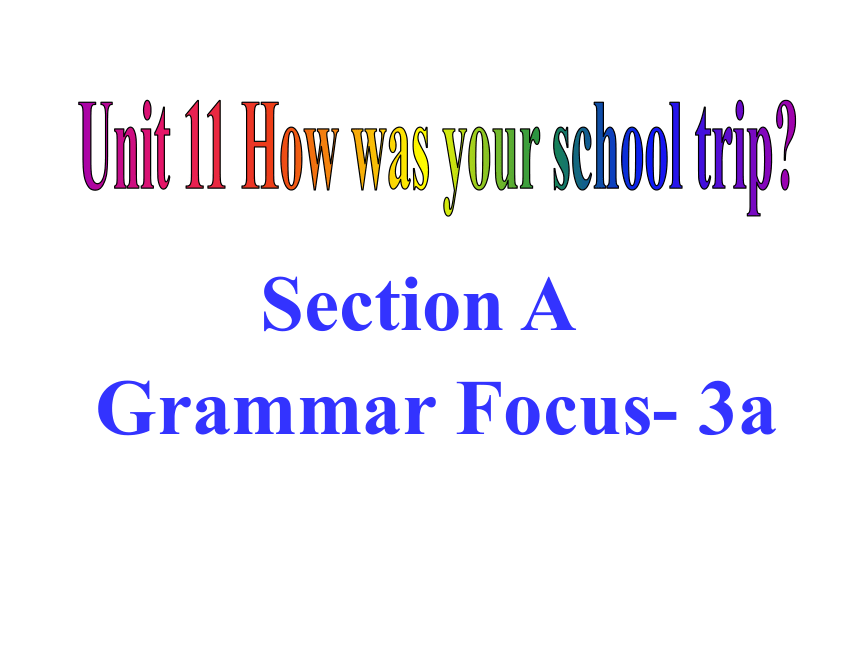
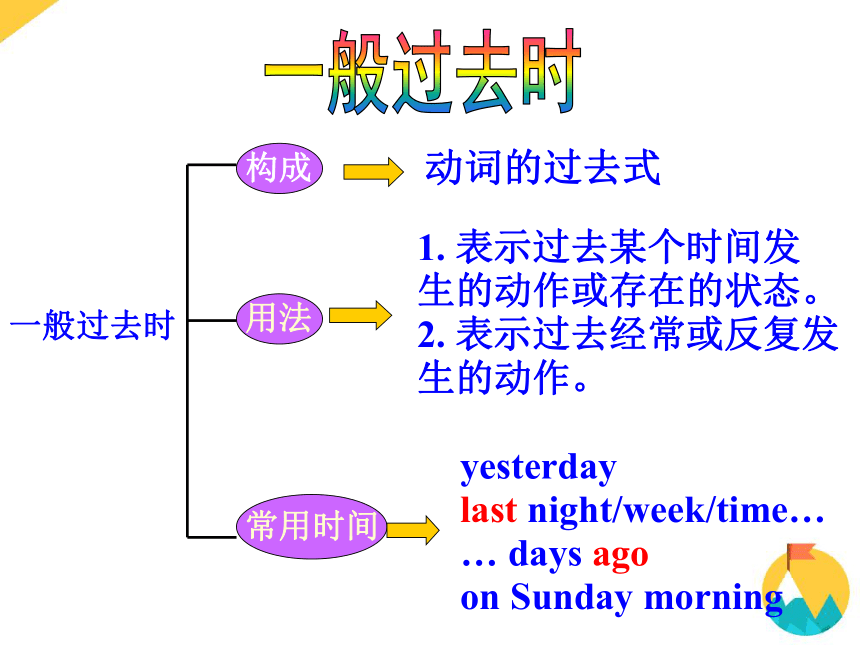
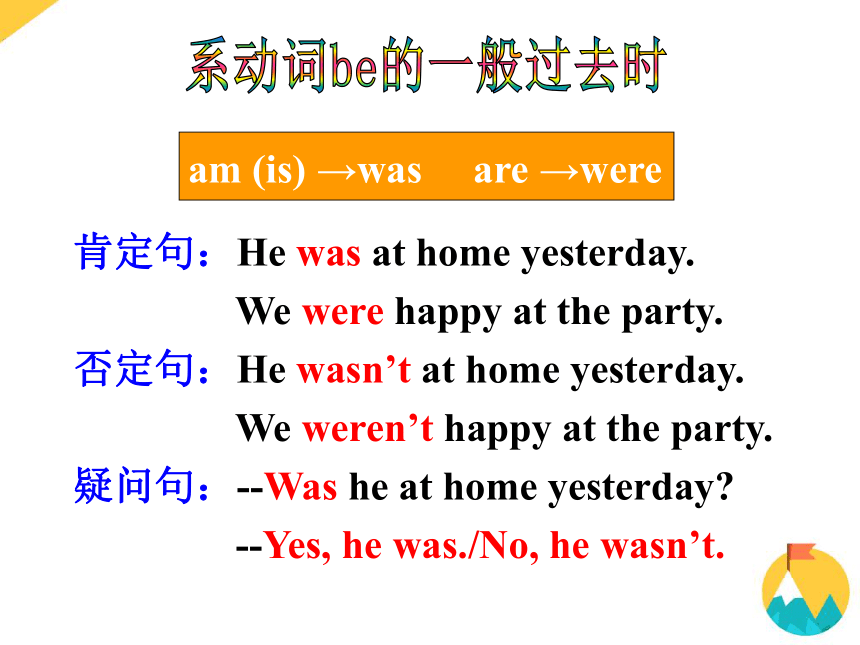
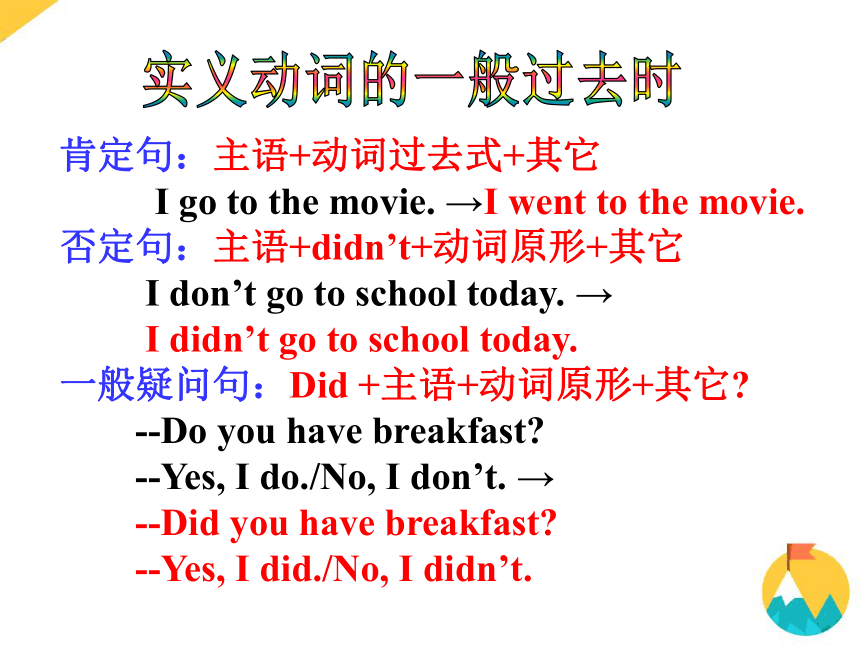
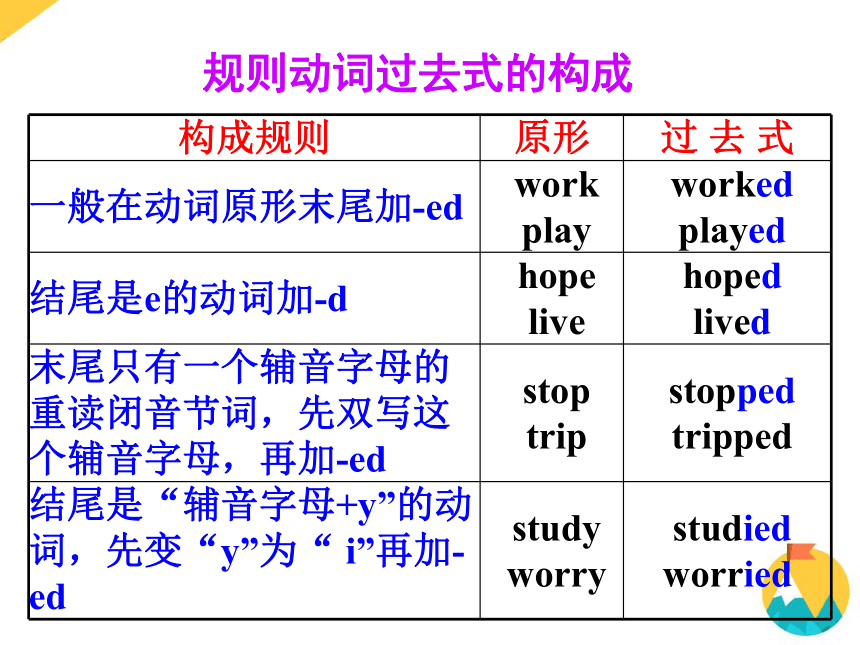
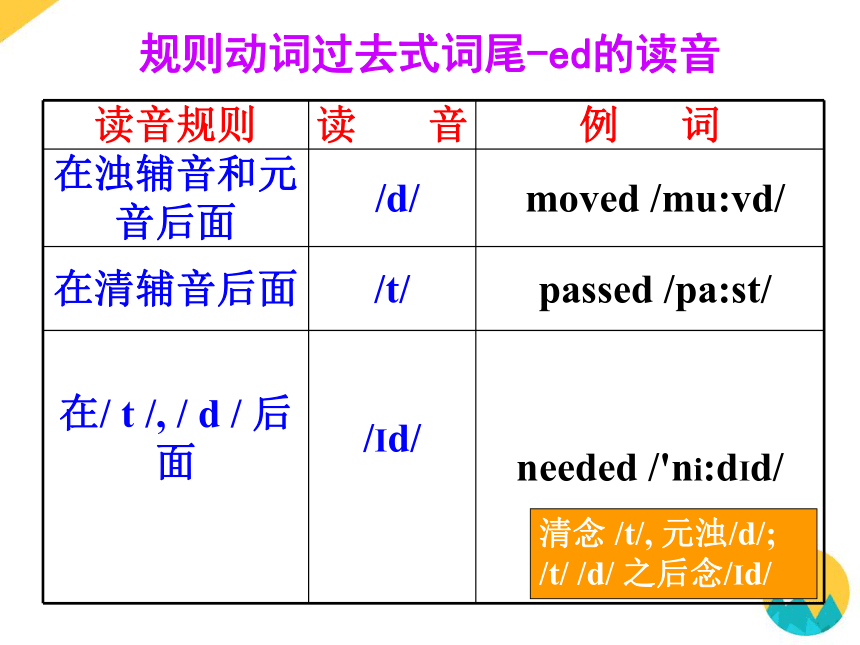
文档简介
(共17张PPT)
1.let
2.lose
3.make
4.meet
5.pay
6.put
7.read
8.ride
9.run
10.say
11.
see
12.sell
13.sing
14.sit
15.sleep
16.speak
17.spend
18.stand
19.swim
20.take
21.teach
22.tell
23.think
24.wake
25.wear
26.write
Unit
11
How
was
your
school
trip?
Section
A
Grammar
Focus-
3a
动词的过去式
1.
表示过去某个时间发
生的动作或存在的状态。
2.
表示过去经常或反复发
生的动作。
yesterday
last
night/week/time…
…
days
ago
on
Sunday
morning
一般过去时
一般过去时
用法
构成
常用时间
肯定句:He
was
at
home
yesterday.
We?were?happy
at
the
party.
否定句:He
wasn’t
at
home
yesterday.
We?weren’t?happy
at
the
party.
疑问句:--Was
he
at
home
yesterday?
--Yes,
he
was./No,
he
wasn’t.
系动词be的一般过去时
am
(is)
→was
are
→were
肯定句:主语+动词过去式+其它
I
go
to
the
movie.
→I
went
to
the
movie.
否定句:主语+didn’t+动词原形+其它
I
don’t
go
to
school
today.
→
I
didn’t
go
to
school
today.
一般疑问句:Did
+主语+动词原形+其它?
--Do
you
have
breakfast?
--Yes,
I
do./No,
I
don’t.
→
--Did
you
have
breakfast?
--Yes,
I
did./No,
I
didn’t.
实义动词的一般过去时
构成规则
原形
过
去
式
一般在动词原形末尾加-ed
work
play
worked
played
结尾是e的动词加-d
hope
live
hoped
lived
末尾只有一个辅音字母的重读闭音节词,先双写这个辅音字母,再加-ed
stop
trip
stopped
tripped
结尾是“辅音字母+y”的动词,先变“y”为“
i”再加-ed
study
worry
studied
worried
规则动词过去式的构成
规则动词过去式词尾-ed的读音
读音规则
读
音
例
词
在浊辅音和元音后面
/d/
moved
/mu:vd/
在清辅音后面
/t/
passed
/pa:st/
在/
t
/,
/
d
/
后面
/Id/
needed
/'ni:dId/
清念
/t/,
元浊/d/;
/t/
/d/
之后念/Id/
动词一般过去时,
表示过去发生事;
be用was或用were,
have,
has变had;
谓语动词过去式,
过去时间做标志;
一般动词加-ed,
若是特殊得硬记。
否定句很简单,
主语之后didn’t添;
疑问句也不难,
did放在主语前;
如果谓语之前有did,
谓语动词需还原;
动词若是was,
were,
否定就把not添。
巧记一般过去时
Let’s
help
them
to
complete
the
letters.
Dear
Bill,
How
____
(is)
your
school
trip
yesterday?
____
(Do)
you
____
(go)
to
the
zoo?
____
(do)
you
take
any
photos?
____
(Do)
you
_____
(see)
any
interesting
animals?
I
_____
(go)
to
the
zoo
last
year
and
it
_____
(is)
a
lot
of
fun.
Jim
was
Did
go
Did
Did
see
went
was
Dear
Jim,
My
school
trip
___
(is)
great!
We
___
(have)
so
much
fun!
We
____
(go)
to
Green
Park.
We
_______
(climb)
the
mountains
there
and
____
(see)
a
lot
of
flowers.
We
___
(eat)
our
lunch
under
some
trees
and
______
(play)
some
games
after
that.
But
at
about
two
o’clock,
it
____
(get)
very
cloudy
and
we
_______
(worry)
it
would
rain.
Luckily,
it
______
(do
not),
and
the
sun
_____
(come)
out
again!
Bill
was
had
went
climbed
saw
ate
played
got
worried
didn’t
came
Read
the
two
letters
on
page
63
and
answer
the
questions.
3a
Letter
1:
1.
Who
wrote
the
first
letter?
It
was
a
letter
from
Jim./Jim
did.
2.
Why
did
he
write
the
letter?
He
wanted
to
know
about
Bill’s
school
trip.
Letter
2:
1.
Who
wrote
the
second
letter?
It
was
a
letter
from
Bill./Bill
did.
2.
What
did
he
write
about?
He
wrote
about
his
school
trip
to
Green
Park.
5.worry v.
&
n.
担心;担忧
【点拨】worry既可以作及物动词,意为“使担心;使担忧”,也可以作不及物动词,后接介词时,常用about,意为“忧虑;担心”。如:
I
have
nothing
to
worry
about.
我没有什么可担心的。
【延伸】(1)worried既可以是worry的过去式,也可以作形容词,意为“担忧的;发愁的”。如:
He
looks
worried.
他看起来很担忧。
(2)worry还可以作可数名词,意为“令人担忧的事”。如:
He
has
a
lot
of
worries
at
the
moment.
他此刻有很多烦心事。
I.?根据句意及括号内所给词的提示填空。
1.
In
2015,
this
boy
________(be)
in
our
class.
2.
His
father
___________(not
watch)
TV
just
now.
3.
Last
term
they
always
________(eat)
in
the
dining
hall.
4.
Did
it
________(get)
cloudy?
5.
Simon
________(learn)
a
lot
about
drawing
and
he
could
draw
well.
learned
was?
didn’t
watch
ate?
get?
II.?根据括号内的要求完成下列各题,
每
空一词(含缩略形式)。
1.
My
grandma
was
well
in
2012.
?(改为
一般疑问句)
______
______
grandma
well
in
2012?
2.?All
the
children
went
to
the
library.
?(改
为一般疑问句)
_______
all
the
children
________
to
the
library?
Was
your??
Did
go
3.?—Were
your
parents
in
Beijing
on
vacation
last
month??
(补全肯定答语)
—Yes,?________??________.
4.?—Did
your
sister
eat
breakfast
this
morning?
(补全否定答语)
—No,
________?________.
5.?Ms.
White’s
vacation
was?very
great.
(对
划线部分提问)
_______?_______?Ms.
White’s
vacation?
How
was
they
were?
she
didn’t
1.let
2.lose
3.make
4.meet
5.pay
6.put
7.read
8.ride
9.run
10.say
11.
see
12.sell
13.sing
14.sit
15.sleep
16.speak
17.spend
18.stand
19.swim
20.take
21.teach
22.tell
23.think
24.wake
25.wear
26.write
Unit
11
How
was
your
school
trip?
Section
A
Grammar
Focus-
3a
动词的过去式
1.
表示过去某个时间发
生的动作或存在的状态。
2.
表示过去经常或反复发
生的动作。
yesterday
last
night/week/time…
…
days
ago
on
Sunday
morning
一般过去时
一般过去时
用法
构成
常用时间
肯定句:He
was
at
home
yesterday.
We?were?happy
at
the
party.
否定句:He
wasn’t
at
home
yesterday.
We?weren’t?happy
at
the
party.
疑问句:--Was
he
at
home
yesterday?
--Yes,
he
was./No,
he
wasn’t.
系动词be的一般过去时
am
(is)
→was
are
→were
肯定句:主语+动词过去式+其它
I
go
to
the
movie.
→I
went
to
the
movie.
否定句:主语+didn’t+动词原形+其它
I
don’t
go
to
school
today.
→
I
didn’t
go
to
school
today.
一般疑问句:Did
+主语+动词原形+其它?
--Do
you
have
breakfast?
--Yes,
I
do./No,
I
don’t.
→
--Did
you
have
breakfast?
--Yes,
I
did./No,
I
didn’t.
实义动词的一般过去时
构成规则
原形
过
去
式
一般在动词原形末尾加-ed
work
play
worked
played
结尾是e的动词加-d
hope
live
hoped
lived
末尾只有一个辅音字母的重读闭音节词,先双写这个辅音字母,再加-ed
stop
trip
stopped
tripped
结尾是“辅音字母+y”的动词,先变“y”为“
i”再加-ed
study
worry
studied
worried
规则动词过去式的构成
规则动词过去式词尾-ed的读音
读音规则
读
音
例
词
在浊辅音和元音后面
/d/
moved
/mu:vd/
在清辅音后面
/t/
passed
/pa:st/
在/
t
/,
/
d
/
后面
/Id/
needed
/'ni:dId/
清念
/t/,
元浊/d/;
/t/
/d/
之后念/Id/
动词一般过去时,
表示过去发生事;
be用was或用were,
have,
has变had;
谓语动词过去式,
过去时间做标志;
一般动词加-ed,
若是特殊得硬记。
否定句很简单,
主语之后didn’t添;
疑问句也不难,
did放在主语前;
如果谓语之前有did,
谓语动词需还原;
动词若是was,
were,
否定就把not添。
巧记一般过去时
Let’s
help
them
to
complete
the
letters.
Dear
Bill,
How
____
(is)
your
school
trip
yesterday?
____
(Do)
you
____
(go)
to
the
zoo?
____
(do)
you
take
any
photos?
____
(Do)
you
_____
(see)
any
interesting
animals?
I
_____
(go)
to
the
zoo
last
year
and
it
_____
(is)
a
lot
of
fun.
Jim
was
Did
go
Did
Did
see
went
was
Dear
Jim,
My
school
trip
___
(is)
great!
We
___
(have)
so
much
fun!
We
____
(go)
to
Green
Park.
We
_______
(climb)
the
mountains
there
and
____
(see)
a
lot
of
flowers.
We
___
(eat)
our
lunch
under
some
trees
and
______
(play)
some
games
after
that.
But
at
about
two
o’clock,
it
____
(get)
very
cloudy
and
we
_______
(worry)
it
would
rain.
Luckily,
it
______
(do
not),
and
the
sun
_____
(come)
out
again!
Bill
was
had
went
climbed
saw
ate
played
got
worried
didn’t
came
Read
the
two
letters
on
page
63
and
answer
the
questions.
3a
Letter
1:
1.
Who
wrote
the
first
letter?
It
was
a
letter
from
Jim./Jim
did.
2.
Why
did
he
write
the
letter?
He
wanted
to
know
about
Bill’s
school
trip.
Letter
2:
1.
Who
wrote
the
second
letter?
It
was
a
letter
from
Bill./Bill
did.
2.
What
did
he
write
about?
He
wrote
about
his
school
trip
to
Green
Park.
5.worry v.
&
n.
担心;担忧
【点拨】worry既可以作及物动词,意为“使担心;使担忧”,也可以作不及物动词,后接介词时,常用about,意为“忧虑;担心”。如:
I
have
nothing
to
worry
about.
我没有什么可担心的。
【延伸】(1)worried既可以是worry的过去式,也可以作形容词,意为“担忧的;发愁的”。如:
He
looks
worried.
他看起来很担忧。
(2)worry还可以作可数名词,意为“令人担忧的事”。如:
He
has
a
lot
of
worries
at
the
moment.
他此刻有很多烦心事。
I.?根据句意及括号内所给词的提示填空。
1.
In
2015,
this
boy
________(be)
in
our
class.
2.
His
father
___________(not
watch)
TV
just
now.
3.
Last
term
they
always
________(eat)
in
the
dining
hall.
4.
Did
it
________(get)
cloudy?
5.
Simon
________(learn)
a
lot
about
drawing
and
he
could
draw
well.
learned
was?
didn’t
watch
ate?
get?
II.?根据括号内的要求完成下列各题,
每
空一词(含缩略形式)。
1.
My
grandma
was
well
in
2012.
?(改为
一般疑问句)
______
______
grandma
well
in
2012?
2.?All
the
children
went
to
the
library.
?(改
为一般疑问句)
_______
all
the
children
________
to
the
library?
Was
your??
Did
go
3.?—Were
your
parents
in
Beijing
on
vacation
last
month??
(补全肯定答语)
—Yes,?________??________.
4.?—Did
your
sister
eat
breakfast
this
morning?
(补全否定答语)
—No,
________?________.
5.?Ms.
White’s
vacation
was?very
great.
(对
划线部分提问)
_______?_______?Ms.
White’s
vacation?
How
was
they
were?
she
didn’t
同课章节目录
- Unit 1 Can you play the guitar?
- Section A
- Section B
- Unit 2 What time do you go to school?
- Section A
- Section B
- Unit 3 How do you get to school?
- Section A
- Section B
- Unit 4 Don't eat in class.
- Section A
- Section B
- Unit 5 Why do you like pandas?
- Section A
- Section B
- Unit 6 I'm watching TV.
- Section A
- Section B
- Review of Units 1-6
- Unit 7 It's raining!
- Section A
- Section B
- Unit 8 Is there a post office near here?
- Section A
- Section B
- Unit 9 What does he look like?
- Section A
- Section B
- Unit 10 I'd like some noodles.
- Section A
- Section B
- Unit 11 How was your school trip?
- Section A
- Section B
- Unit 12 What did you do last weekend?
- Section A
- Section B
